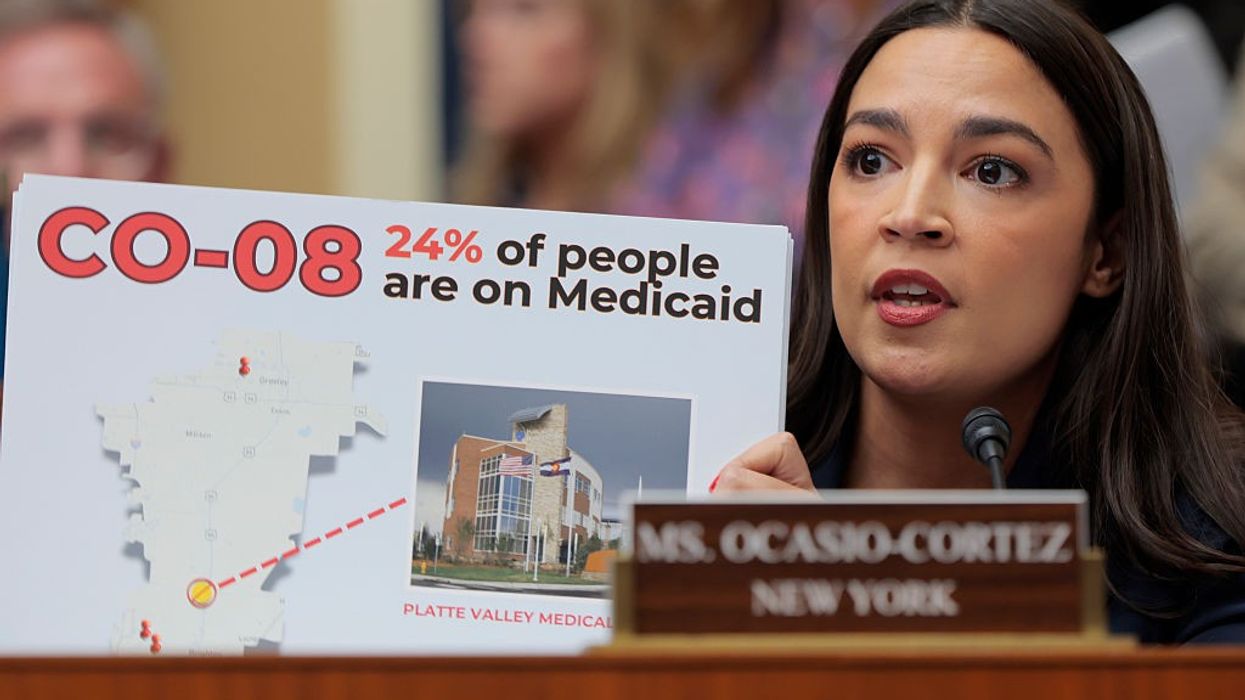April, 13 2021, 12:00am EDT

Public Oral Argument in Lawsuit Challenging FDA Approval of Genetically Engineered Ingredient That Makes Impossible Burger 'Bleed'
Tomorrow, on Wednesday, April 14, the U.S. Court of Appeals for the Ninth Circuit will hear arguments in Center for Food Safety's (CFS) ongoing lawsuit challenging the U.S. Food and Drug Administration's (FDA) approval of soy leghemoglobin (a.k.a. "heme"), the novel genetically engineered (GE) color additive that makes Impossible Foods' eponymous plant-based burger, the Impossible Burger, appear to "bleed" like real meat.
WASHINGTON
Tomorrow, on Wednesday, April 14, the U.S. Court of Appeals for the Ninth Circuit will hear arguments in Center for Food Safety's (CFS) ongoing lawsuit challenging the U.S. Food and Drug Administration's (FDA) approval of soy leghemoglobin (a.k.a. "heme"), the novel genetically engineered (GE) color additive that makes Impossible Foods' eponymous plant-based burger, the Impossible Burger, appear to "bleed" like real meat. CFS originally filed the lawsuit in March 2020, challenging FDA's safety review of the genetically engineered color additive.
At stake in tomorrow's argument is whether FDA examined the safety of soy leghemoglobin as a color additive before allowing it to be consumed by millions of consumers across the U.S. In its briefs, CFS argued that FDA applied an unlawful safety standard, and approved soy leghemoglobin without long-term toxicity studies called for by the FDA under its standards for food and color additive testing. The outcome of the case could remove Impossible Foods' plant-based burger products from grocery shelves until their safety for human consumption has been adequately reviewed.
WHAT: Public oral argument in CFS' lawsuit challenging FDA approval of soy leghemoglobin
WHEN: Wednesday, April 14, 2021, at 9 AM PST
WHERE: Ninth Circuit Court of Appeals YouTube Channel
Background:
Soy leghemoglobin, the novel heme colorant used to make the Impossible Burger appear to "bleed," is produced using GE yeast, and is modeled on a protein found in the roots of soybean. Because GE heme is new to the human diet, and substantial quantities are added to the Impossible Burger, FDA should have required extensive safety testing before approving its use as a color additive, as required by law.
While CFS like many others avidly supports plant-based eating, enthusiasm for meatless products cannot be used as an excuse to skirt food safety laws. Because color additives offer no substantive benefits, and add only aesthetic appeal, Congress and FDA established an extremely high bar for approval. The "convincing evidence" standard ("convincing evidence that establishes with reasonable certainty that no harm will result from the intended use of the color additive") means that a color additive cannot be approved without the strongest possible evidence of safety, a higher bar than for other food additives.
CFS' lawsuit asserts that FDA used a lower safety standard than "convincing evidence" when it reviewed and approved GE heme to be used in raw Impossible Burgers sold in grocery stores. The lawsuit further alleges that Impossible Burger failed to submit long-term animal feeding studies for cancer, reproductive impairment and other adverse effects, which are required by FDA's Redbook, the "Bible" of food and color additive testing. This lack of testing is all the more troubling because a number of potential adverse effects were detected in a short-term rat trial: disruption of reproductive cycles and reduced uterine weights in females, and biomarkers of anemia, reduced clotting ability, and kidney problems.
Center for Food Safety's mission is to empower people, support farmers, and protect the earth from the harmful impacts of industrial agriculture. Through groundbreaking legal, scientific, and grassroots action, we protect and promote your right to safe food and the environment. CFS's successful legal cases collectively represent a landmark body of case law on food and agricultural issues.
(202) 547-9359LATEST NEWS
House GOP to Skip Town Early for Holiday Recess as Healthcare Premiums Soar, Epstein Files Loom
"The same GOP that voted last summer to give the richest Americans and most profitable companies trillions of dollars in tax cuts somehow can't find the funds this winter to ensure 20 million Americans can afford their health insurance."
Dec 18, 2025
The US House was originally scheduled to be in session on Friday, but the Republican leadership gave members a green light to skip town on Thursday for the two-week holiday recess without voting to prevent massive health insurance premium hikes for tens of millions of Americans.
The decision to let members leave early came after House Democrats secured enough support from swing-district Republicans to force a vote on legislation that would extend Affordable Care Act (ACA) subsidies that are set to expire on December 31, sending premiums soaring.
Democrats on Wednesday demanded an immediate vote on the proposed three-year extension of the ACA tax credits, but Republicans instead pushed to the floor and passed their own healthcare bill that would leave around 100,000 more Americans uninsured per year over the next decade—on top of the millions set to lose coverage due to the expiration of the enhanced subsidies.
The GOP bill is doomed to fail in the narrowly Republican-controlled Senate, which voted down a Democratic push for an extension of the subsidies earlier this month.
More than 20 million Americans relied on the tax credits to afford health insurance. With their expiration, ACA marketplace premiums are set to more than double on average, pricing many people out of coverage entirely.
"Congressional Republicans could have followed through on their promises to help families afford the basics by extending the premium tax credit enhancements to help them enroll in affordable, comprehensive coverage. Instead, they recycled old ideas, refused to address the current affordability crisis—and made plans to go home," Sharon Parrott, president of the Center on Budget and Policy Priorities, said in a statement Wednesday.
"On the brink of this deadline, some Republicans have recognized that the stakes for families are too high to do nothing," Parrott added, pointing to the four GOP lawmakers who signed the discharge petition. "A House bill to extend the premium tax credit enhancements now has the required signatures on its discharge petition to force a vote on the House floor. Republican policymakers should step up and put the needs of individuals and families first."
"If Speaker Johnson refuses to bring forth the vote, he’s telling the American people loud and clear that rising healthcare costs are acceptable to him."
It's unclear when the discharged House Democratic bill will get a vote, as the chamber is not scheduled to return until January 6, 2026—after the ACA tax credits expire.
"If Speaker Johnson refuses to bring forth the vote, he’s telling the American people loud and clear that rising healthcare costs are acceptable to him," said Rep. Jasmine Crockett (D-Texas), who is running to unseat Sen. John Cornyn (R-Texas) in next year's midterm election.
David Kass, executive director of Americans for Tax Fairness, said in a statement Thursday that "instead of siding with millions of everyday Americans, they voted to increase healthcare costs which will now put affordable coverage out of reach for millions."
"Congressional Republicans once again revealed whose side they're on," said Kass. "The same GOP that voted last summer to give the richest Americans and most profitable companies trillions of dollars in tax cuts somehow can't find the funds this winter to ensure 20 million Americans can afford their health insurance."
The House Republican leadership's decision to start the holiday recess also came ahead of the Friday deadline for the Trump administration to release most of the Epstein files, as required by recently enacted legislation.
"View all political developments for the rest of the week in light of the fact that the Epstein files are supposed to be released on Friday," said Rep. Alexandria Ocasio-Cortez (D-NY). "House Republicans just suddenly cancelled congressional session Friday and are sending everyone home Thursday evening."
Keep ReadingShow Less
63% of US Voters Oppose Attack on Venezuela as Trump's March to War Accelerates
The new poll comes as the US president openly plots to seize Venezuela’s oil supply.
Dec 18, 2025
President Donald Trump has taken increasingly aggressive actions against Venezuela in recent weeks, but a new poll released Wednesday shows US voters are not on board with a new war.
A new poll from Quinnipiac University found that 63% of voters oppose military operations inside Venezuela, with just 25% registering support.
What's more, a US military strike in Venezuela would draw significant opposition even from Republican voters, 33% of whom told Quinnipiac that they would oppose such an action. Eighty-nine percent of Democratic voters and 68% of independent voters said they were opposed to a US military campaign in Venezuela.
Trump's policy of bombing suspected drug trafficking boats in international waters, which many legal experts consider to be acts of murder, drew significantly less opposition in the new survey than a prospective attack on Venezuela, but it is still unpopular, with 42% in favor and 53% opposed.
A potential war is also unpopular with Venezuelans, as a recent survey from Caracas-based pollster Datanalisis found 55% opposed to a foreign military attack on their nation, with 23% in favor.
The Trump administration's boat strikes, which have now killed at least 99 people, have been just one aspect of its campaign of military aggression against Venezuela. The US military last week seized a Venezuelan oil tanker, and Trump has said that it's only a matter of time before the military launches strikes against targets inside the country.
Trump on Wednesday also said that one goal of his campaign against Venezuela would be to seize the country's oil supply.
“Getting land, oil rights, whatever we had—they took it away because we had a president that maybe wasn’t watching,” Trump said while talking to reporters. “But they’re not gonna do that. We want it back. They took our oil rights. We had a lot of oil there. They threw our companies out. And we want it back."
Venezuela first nationalized its oil industry in 1976, and the US has no legitimate claim to the nation's petroleum supply.
Keep ReadingShow Less
AOC Dismisses Premature 2028 Polls, But Says ‘I Would Stomp’ JD Vance
A survey this week showed the congresswoman leading the vice president 51-49 in a hypothetical presidential matchup.
Dec 18, 2025
Rep. Alexandria Ocasio-Cortez gave a cheeky reaction after a poll suggested that she'd slightly edge out Vice President JD Vance in a hypothetical presidential election in 2028.
The survey of over 1,500 registered voters, published Wednesday by The Argument/Verasight, showed Ocasio-Cortez (D-NY) leading Vance 51-49 and winning back several key voting demographics that propelled Trump's return to the White House last year.
As she walked out of the Capitol building Wednesday evening, the Bronx congresswoman was asked about the poll by Pablo Manríquez, the editor of Migrant Insider.
She responded to the question with a laugh: "These polls three years out, they are what they are. But, let the record show I would stomp him! I would stomp him!" she said before getting into her car.
Neither Ocasio-Cortez nor Vance has officially announced a presidential run. But Vance is considered by many to be a natural successor to President Donald Trump. The president and his allies have suggested he could run for an unconstitutional third term.
Ocasio-Cortez, meanwhile, is reportedly mulling either a presidential run or a bid to take down the increasingly unpopular Senate Minority Leader Chuck Schumer (D-NY).
More than two years out from a Democratic primary, Ocasio-Cortez is considered a likely choice to fill the progressive lane in 2028, with support for increasingly popular, affordability-focused policies, including Medicare for All.
However, despite her strong support among young voters, early polls show her behind California Gov. Gavin Newsom and former Vice President Kamala Harris for the Democratic nomination.
Wednesday's poll showed that in a hypothetical contest against Vance, Newsom had a 53% to 47% edge, a margin only slightly larger than Ocasio-Cortez's.
Keep ReadingShow Less
Most Popular


